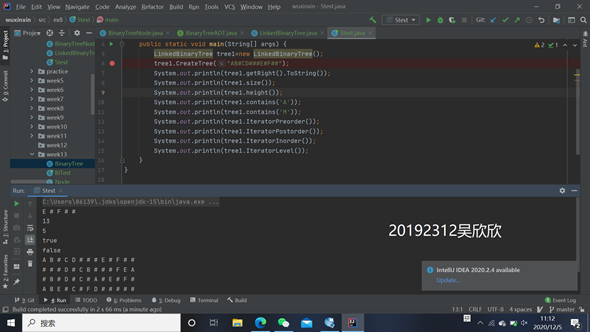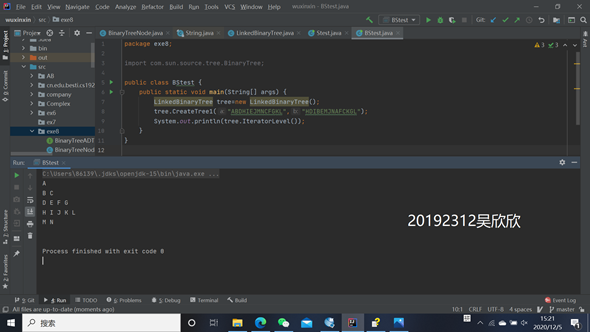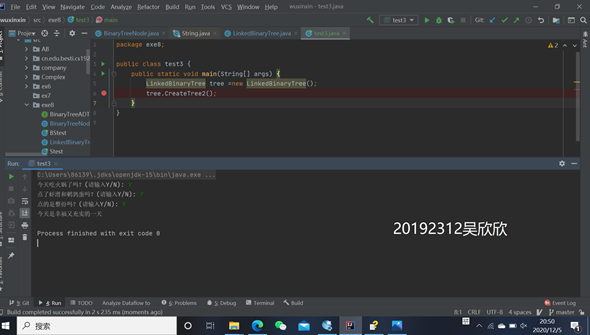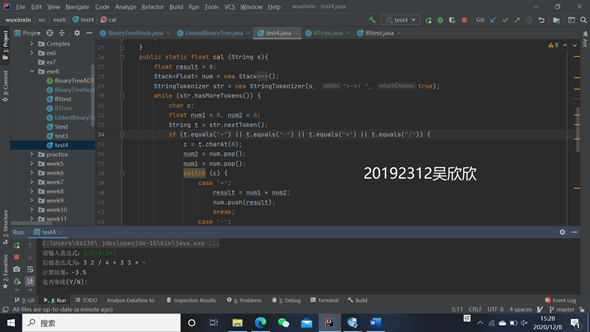20192312吴欣欣 实验八 《面向对象程序设计》实验报告
20192312 2020-2021-1 实验七 《查找与排序》实验报告
课程:《程序设计与数据结构》
班级: 1923
姓名: 吴欣欣
学号:20192312
实验教师:王志强
实验日期:2020年12月8日
必修/选修: 必修
1.实验内容
1.参考教材PP16.1,完成链树LinkedBinaryTree的实现(getRight,contains,toString,preorder,postorder)
用JUnit或自己编写驱动类对自己实现的LinkedBinaryTree进行测试,提交测试代码运行截图,要全屏,包含自己的学号信息
课下把代码推送到代码托管平台
2.基于LinkedBinaryTree,实现基于(中序,先序)序列构造唯一一棵二㕚树的功能,比如给出中序HDIBEMJNAFCKGL和后序ABDHIEJMNCFGKL,构造出附图中的树
用JUnit或自己编写驱动类对自己实现的功能进行测试,提交测试代码运行截图,要全屏,包含自己的学号信息
课下把代码推送到代码托管平台
3.自己设计并实现一颗决策树
提交测试代码运行截图,要全屏,包含自己的学号信息
课下把代码推送到代码托管平台
4.输入中缀表达式,使用树将中缀表达式转换为后缀表达式,并输出后缀表达式和计算结果(如果没有用树,正常评分。如果用到了树,即使有小的问题,也酌情给满分)
提交测试代码运行截图,要全屏,包含自己的学号信息
2.实验过程及结果
1.参考教材PP16.1,完成链树LinkedBinaryTree的实现(getRight,contains,toString,preorder,postorder)
用JUnit或自己编写驱动类对自己实现的LinkedBinaryTree进行测试,提交测试代码运行截图,要全屏,包含自己的学号信息
课下把代码推送到代码托管平台
package exe8;
public class BinaryTreeNode <T> {
protected T element;
protected BinaryTreeNode left, right;
public BinaryTreeNode() {
element = null;
left = null;
right = null;
}
public BinaryTreeNode(T element) {
this.element = element;
left = right = null;
}
public BinaryTreeNode getLeft() {
return left;
}
public BinaryTreeNode getRight() {
return right;
}
public T getElement() {
return element;
}
public void setLeft(BinaryTreeNode left) {
this.left = left;
}
public void setRight(BinaryTreeNode right) {
this.right = right;
}
public BinaryTreeNode find(T target) {
BinaryTreeNode result = null;
if (element.equals(target)) return this;
else {
if (left != null) result = left.find(target);
if (right != null) result = right.find(target);
}
return result;
}
public int count() {
int counter = 1;
if (left != null) counter += left.count();
if (right != null) counter += right.count();
return counter;
}
public int level() {
int level = 1, max = 0;
if (left != null) {
max = left.level();
}
if (right != null && right.level() > max) max = right.level();
return level + max;
}
public String IteratorInOrder() {
String s = "";
if (left != null) s += left.IteratorInOrder();
s += this.element.toString() + " ";
if (right != null) s += right.IteratorInOrder();
return s;
}
public String IteratorPreOrder() {
String s = "";
s += this.element.toString() + " ";
if (left != null) s += left.IteratorPreOrder();
if (right != null) s += right.IteratorPreOrder();
return s;
}
public String IteratorPostOrder() {
String s = "";
if (left != null) s += left.IteratorPostOrder();
if (right != null) s += right.IteratorPostOrder();
s += this.element.toString() + " ";
return s;
}
public BinaryTreeNode Insert(char s) {
BinaryTreeNode result = null;
if (left == null) {
left = new BinaryTreeNode(s);
result=left;
}
else if(!left.element.equals('#'))result=left.Insert(s);
if(result==null){
if (right == null) {
right= new BinaryTreeNode(s);
result=right;
}
else if(!right.element.equals('#'))result=right.Insert(s);
}
return result;
}
public void Insert1(String a,String b) {
int i = 0, j;
for (j = 0; b.charAt(j) != a.charAt(i) && j < b.length(); j++) ;
if (left == null) {
if(j!=0) {
left = new BinaryTreeNode(a.charAt(1));
left.Insert1(a.substring(i + 1, j + 1), b.substring(0, j)); }
}
if (right == null) {
if(j!=b.length()-1) {
right = new BinaryTreeNode(a.charAt(j + 1));
right.Insert1(a.substring(j + 1), b.substring(j + 1)); }
}
}
}
package exe8;
import java.util.Scanner;
public class LinkedBinaryTree <T> implements BinaryTreeADT {
BinaryTreeNode root;
public LinkedBinaryTree(){
root=null;
}
public LinkedBinaryTree(T element){
root=new BinaryTreeNode(element);
}
public LinkedBinaryTree(T element,LinkedBinaryTree left,LinkedBinaryTree right){
root=new BinaryTreeNode(element);
root.setLeft(left.root);
root.setRight(right.root);
}
@Override
public T getRootElement() {
if(root==null)return null;
return (T) root.element;
}
@Override
public boolean isEmpty() {
if(root==null)return true;
else return false;
}
public LinkedBinaryTree getLeft(){
if(root==null)return null;
LinkedBinaryTree result = new LinkedBinaryTree();
result.root = root.getLeft();
return result;
}
public LinkedBinaryTree getRight(){
if(root==null)return null;
LinkedBinaryTree result = new LinkedBinaryTree();
result.root = root.getRight();
return result;
}
public void CreateTree(String s){//前序遍历插入,以#表示空
root=new BinaryTreeNode(s.charAt(0));
for(int i=1;i<s.length();i++){
root.Insert(s.charAt(i));
}
}
public void CreateTree1(String a,String b){//通过前序,中序确定一棵树
root=new BinaryTreeNode(a.charAt(0));
root.Insert1(a,b);
}
public void CreateTree2(){//决策树
String s1="今天吃火锅了吗?";
String s2="点了虾滑和鹌鹑蛋吗?";
String s3="点的是整份吗?";
String s4="今天是不幸的一天。";
String s5="今天是不完整的一天。";
String s6="今天是幸福但不完整的一天。";
String s7="今天是幸福又充实的一天";
BinaryTreeNode n1,n2,n3,n4,n5,n6,n7;
n1=new BinaryTreeNode(s1);
n2=new BinaryTreeNode(s2);
n3=new BinaryTreeNode(s3);
n4=new BinaryTreeNode(s4);
n5=new BinaryTreeNode(s5);
n6=new BinaryTreeNode(s6);
n7=new BinaryTreeNode(s7);
n1.setLeft(n2);
n1.setRight(n4);
n2.setLeft(n3);
n2.setRight(n5);
n3.setLeft(n7);
n3.setRight(n6);
root=n1;
decision(root);
}
public void decision(BinaryTreeNode root){
Scanner scan=new Scanner(System.in);
BinaryTreeNode current=root;
while(current.left!=null||current.right!=null){
System.out.print(current.getElement()+"(请输入Y/N): ");
if(scan.next().equalsIgnoreCase("y"))current=current.left;
else current=current.right;
}
System.out.println(current.getElement());
}
@Override
public int size() {
if(root==null)return 0;
return root.count();
}
@Override
public int height() {
if(root==null)return 0;
return root.level();
}
@Override
public boolean contains(Object target) {
if(root==null)return false;
T a=(T)target;
if(root.find(a)==null)return false;
else return true;
}
@Override
public BinaryTreeNode find(Object target) {
if(root==null)return null;
T a=(T)target;
return root.find(a);
}
@Override
public String IteratorInorder() {
if(root==null)return null;
else return root.IteratorInOrder();
}
@Override
public String IteratorPreorder() {
if(root==null)return null;
else return root.IteratorPreOrder();
}
@Override
public String IteratorPostorder() {
if(root==null)return null;
else return root.IteratorPostOrder();
}
@Override
public String IteratorLevel() {
String s="";
int i,j,count=1;
int t[]=new int[20];
BinaryTreeNode m[]=new BinaryTreeNode [20];
m[0]=root;
t[0]=count;
for(i=0,j=1,count=2;i!=j;i++){
if(m[i].left!=null){m[j]=m[i].left;t[j]=t[i]+1;j++;}
if(m[i].right!=null){m[j]=m[i].right;t[j]=t[i]+1;j++;}
s+=m[i].element+" ";
if(t[i+1]!=t[i]) s+="\n";
}
return s;
}
public String ToString(){
return root.IteratorPreOrder();
}
}

2.基于LinkedBinaryTree,实现基于(中序,先序)序列构造唯一一棵二㕚树的功能,比如给出中序HDIBEMJNAFCKGL和后序ABDHIEJMNCFGKL,构造出附图中的树
用JUnit或自己编写驱动类对自己实现的功能进行测试,提交测试代码运行截图,要全屏,包含自己的学号信息
课下把代码推送到代码托管平台

3.自己设计并实现一颗决策树
提交测试代码运行截图,要全屏,包含自己的学号信息
课下把代码推送到代码托管平台

4.输入中缀表达式,使用树将中缀表达式转换为后缀表达式,并输出后缀表达式和计算结果(如果没有用树,正常评分。如果用到了树,即使有小的问题,也酌情给满分)
提交测试代码运行截图,要全屏,包含自己的学号信息
package exe8;
import java.util.LinkedList;
import java.util.Queue;
import java.util.Stack;
import java.util.StringTokenizer;
public class BTtree <T>{
BinaryTreeNode root;
public BTtree (){
root=null;
}
public void CreateTree(String s){
Stack<BinaryTreeNode> num= new Stack<BinaryTreeNode>();
Stack<BinaryTreeNode> num1= new Stack<BinaryTreeNode>();
Queue<BinaryTreeNode> op=new LinkedList<BinaryTreeNode>();
BinaryTreeNode temp,temp1;
StringTokenizer str=new StringTokenizer(s,"+-*/",false);
while(str.hasMoreTokens()){num1.push(new BinaryTreeNode(str.nextToken()));}
while(!num1.isEmpty()){num.push(num1.pop());}
for(int i=0;i<s.length();i++){
if(s.charAt(i)=='+'||s.charAt(i)=='-'||s.charAt(i)=='*'||s.charAt(i)=='/')
op.offer(new BinaryTreeNode(s.charAt(i)));
}
while(!op.isEmpty()){
temp=op.poll();
if(op.isEmpty()){
temp.left=num.pop();
temp.right=num.pop();
num.push(temp);
break;
}
if(pri(temp.element.toString().charAt(0),op.peek().element.toString().charAt(0))){
temp.left=num.pop();
temp.right=num.pop();
num.push(temp);
}
else{
temp.left=num.pop();
temp.right=op.peek();
int count=0;
while(count==0){
temp1=op.poll();
if(op.isEmpty()){
temp1.left=num.pop();
temp1.right=num.pop();
num.push(temp1);
break;
}
if(pri(temp1.element.toString().charAt(0),op.peek().element.toString().charAt(0))){
temp1.left=num.pop();
temp1.right=num.pop ();
count=1;
}
else{
temp1.left=num.pop();
temp1.right=op.peek();
}
}
num.push(temp);
}
}
root=num.peek();
}
public String IteratorPostorder() {
if(root==null)return null;
else return root.IteratorPostOrder();
}
public boolean pri(char a,char b){
boolean result=true;
if(a=='+'||a=='-'){
switch(b){
case '+':result=true;break;
case '-':result=true;break;
case '*':result=false;break;
case '/':result=false;break;
default:result=false;break;
}
}
if(a=='*'||a=='/'){
switch(b){
case '+':result=true;break;
case '-':result=true;break;
case '*':result=true;break;
case '/':result=true;break;
default:result=false;break;
}
}
return result;
}
}


3.心得体会
经过学习对树的了解又深了一层。通过中缀表达式转后缀表达式,也回顾了关于栈的知识。



